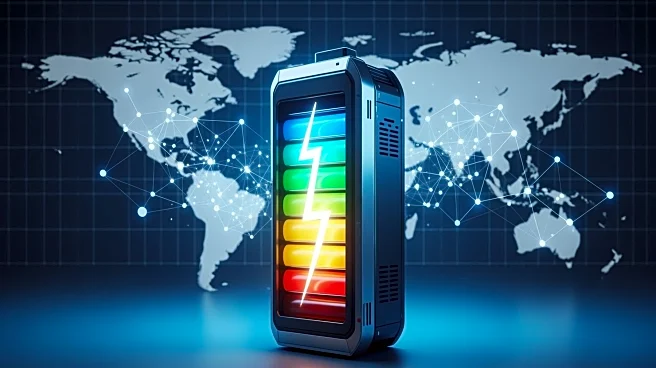What's Happening?
The U.S. energy storage market is demonstrating resilience despite global trade uncertainties and policy challenges. BloombergNEF projects significant growth in energy storage additions worldwide, with
expectations of 92 GW / 247 GWh in 2025, marking a 22.7% increase from 2024. This growth is anticipated despite earlier concerns over federal energy tax credits and trade policies under President Trump's administration. The final budget bill signed in July preserved tax credits for U.S. energy storage installations and manufacturing, providing a clearer outlook for the industry. Analysts, including Isshu Kikuma from BloombergNEF, express cautious optimism, noting that market players are adapting to the new environment. The U.S. demand for energy storage remains strong, supported by investments from foreign firms, particularly Korean companies like LG Energy Solution, which plans to expand manufacturing capacity in Michigan.
Why It's Important?
The resilience of the U.S. energy storage market is crucial for the country's clean energy transition and economic growth. The preservation of tax credits for energy storage installations ensures continued investment and development in this sector, which is vital for reducing reliance on intermittent renewable resources. The growth in energy storage capacity supports the stability and reliability of the power grid, enabling greater integration of renewable energy sources. This development is significant for U.S. energy independence and sustainability goals, as well as for maintaining competitiveness in the global energy market. The involvement of foreign companies in expanding U.S. manufacturing capacity further strengthens the domestic industry and creates job opportunities.
What's Next?
Energy storage developers are racing to begin construction on projects before 2026, when new restrictions on battery components tied to China will take effect. This urgency is driven by the need to comply with upcoming regulations and to capitalize on preserved tax credits. The expansion of U.S. lithium-ion battery module manufacturing is expected to continue, although Chinese firms currently dominate the market for battery cells and materials. The industry will likely see increased investment and collaboration with international partners to boost manufacturing capacity and meet growing demand. The focus will be on overcoming hurdles related to foreign equipment and materials, ensuring the U.S. remains a leader in energy storage technology.
Beyond the Headlines
The U.S. energy storage market's growth has broader implications for global energy dynamics. As countries in the Global South, such as India and Brazil, increase their energy storage capacities, the U.S. can play a pivotal role in shaping international energy policies and standards. The shift towards energy storage also highlights the need for sustainable and ethical sourcing of materials, particularly in light of geopolitical tensions with China. The industry's expansion may drive innovation in battery technology and recycling processes, addressing environmental concerns associated with battery production and disposal.









